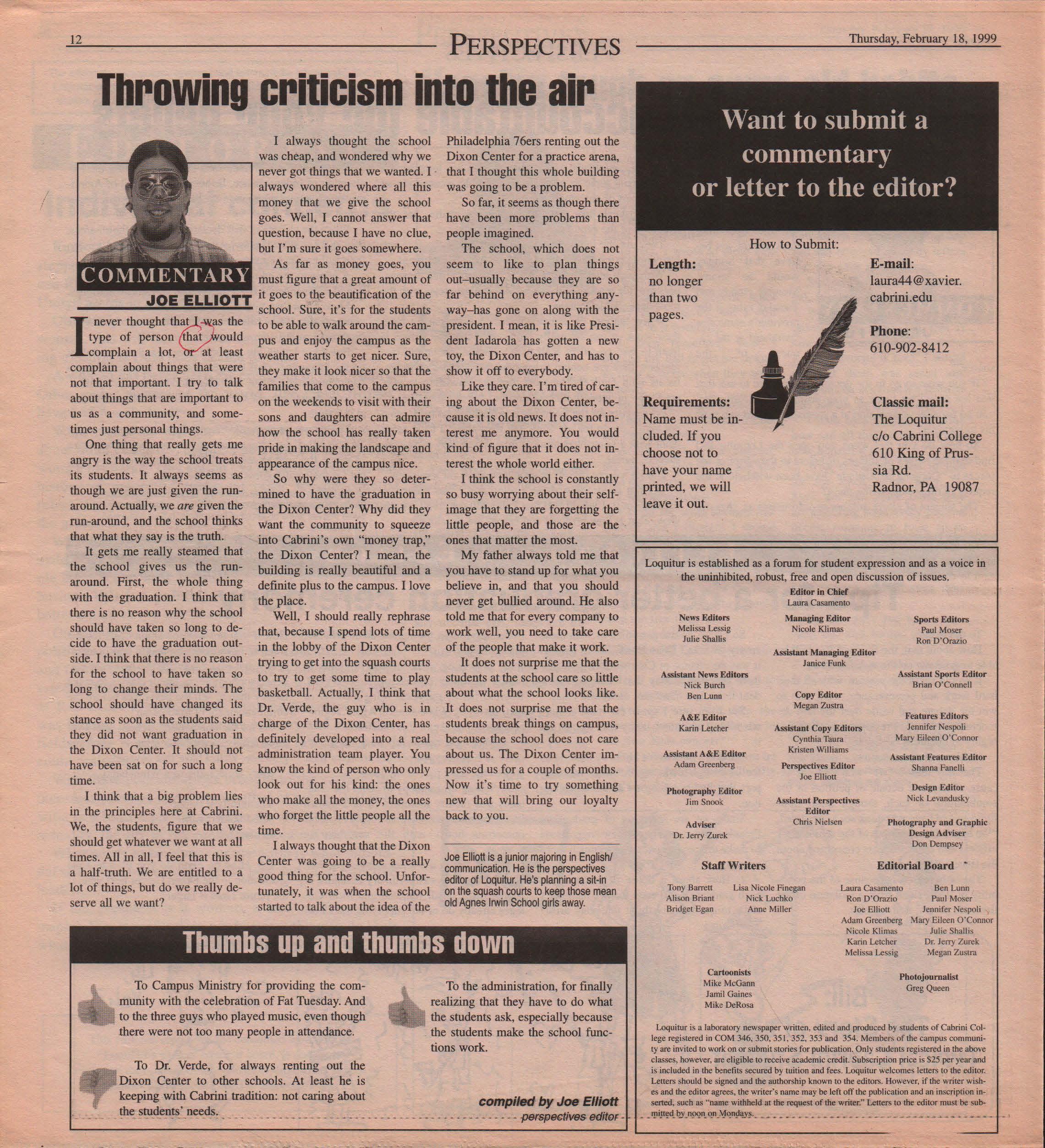
3 minute read
Faculty, administration engage in tug-of-war for power
by BenjaminLunn assistant news editor
A war of sorts has broken out between the faculty and administration over the last few years.
Advertisement
The controversy centers around certain ideas: what is the faculty's role in governing the college versus the power of the administration?
The issue is seen from two angles.
Faculty members see the issue from one angle and the administration from another.
Each side wants a clarification and an elaboration upon the system set up within the pages of the Faculty Handbook.
However, each side has their own view of reasons for revision, and what is necessary in revision.
Dr. Sharon Schwarze, the humanities department chair, feels that the problems arise within the context of the national trend for the administration to become more business-like.
Within that view, the slower, democratic process of the Faculty Senate affects the ability of the college curriculum to effectively meet the market trends of the nation.
This trend is not isolated solely within Cabrini's gates.
In fact, it is a nationwide topic of discussion within the Chronicle of Higher Education, the American Association of University Professors, and the American Governing Board.
Schwarze feels that it is the re- sponsibility of the Faculty Senate to keep the college from following the "fads" of society, and to maintain the academic integrity of the school.
The administration, in Schwarze's view, does not concern itself with the academic integrity of the school. It feels that it is not the job of the administration to do so.
Schwarze stated that she believes that the administration wants the ability of decision making to become more concrete and faster-paced.
This is the best way for the college to capitalize on the market trends, thereby gaining more students and money.
Dr. Mary Alice Muellerleile, the interim provost and academic dean, calls herself a professional schizophrenic, saying that she is fighting for each side.
Muellerleile believes that the reason for the revisions centers around the protection of the school.
In the older handbooks, the criteria and processes for tenure, promotion and faculty governance in general were sketchy at best.
By elaborating upon the criteria, and revising them, the college will be defending itself from lawsuits.
The conflicts within the handbook are the result of unclear phrasing, and overlaps within the responsibilities of each committee.
More detail in the outlines are necessary to protect the school, the students, and the faculty, nance currently used here has existed in some form for over 27 years. governance was ordered to be revised.
Muellerleile said.
As to the accusations of people such as Schwarze, "Educational institutions are becoming more like a business," Muellerleile says.
According to her, Cabrini is a business. The school has bills and a budget to balance.
It consists of three main parts: the Academic Council, the Curriculum Committee and the Faculty Senate.
The Academic Council, according to the 1993 edition of the Faculty Handbook, has many responsibilities.
It has the task of considering and recommending new majors to faculty and administration, as well as discussing minors and concentrations.
Core curriculum requirements come under the scrutiny of the Academic Council.
In 1994, when the finalized revisions were proposed, the revisions were rejected.
The fall of last year was when the faculty returned to the drawing board.
This cloud over the school may, however, have a silver lining.
There is a lot of pressure from outside forces for the administration and faculty to reach a "collaborative point of view," according to Muellerleile and Schwarze.
"Education is the heart of the venture, but it is the business that keeps the venture going," said Muellerleile.
She also said that that was an accusation made at all schools. Cabrini is no exception.
The handbooks given to students at the beginning of every year are a stable outline and explanation of the rules and regulations for students.
Faculty also have their own handbook, although the term "stable outline" may not apply anymore.
All colleges and universities in the United States have some system of faculty governance.
The system of faculty gover-
Recommendations of the Student Academic Council go through the Council, and it works with the Office of Academic Affairs on departmental evaluations, among other duties.
The Curriculum Committee evaluates the core curriculum of the college and makes recommendations in keeping with the college's model of the "qualities of a liberally educated person."
The Faculty Senate is comprised of all faculty of the school.
The major concerns of the Senate center around the tenure, promotion and employment of the faculty. All decisions go through the Senate.
The student handbook is revised on a yearly basis, but the faculty's handbook is not.
In 1992, at the start of Dr. Antoinette Iadarola's presidency of the college, the system of faculty
All colleges are accredited; that is, judged to meet a set standard in education. Middle States, one of these accrediting agencies, is responsible for a lot of the outside pressure to end this controversy. Due to this pressure, there has been a lot of compromise on the subject. When asked about compromise, Schwarze said, 'The faculty makes a lot of compromises."
Muellerleile feels that the compromise is mutual, and that this is a collaborative effort, and in such an effort, negotiations are occurring.
Currently a draft has been given to Muellerleile to read over, before it is given to the Faculty Senate.
Eventually a finalized draft will pass through the hands of the Faculty Senate, attorneys, the academic dean, the president and finally the board of trustees, with whom the final decision will rest.








